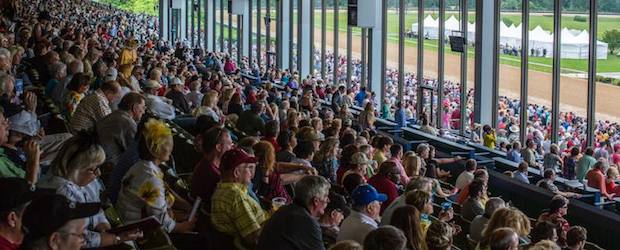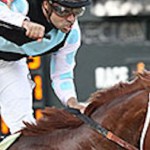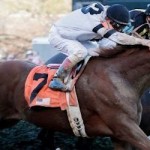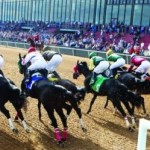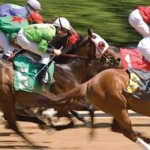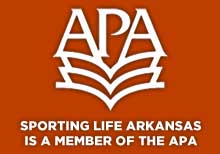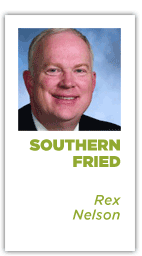 A cool wind was blowing and the clouds were thickening as Eric Jackson walked through the Oaklawn Park grandstand last Friday.
A cool wind was blowing and the clouds were thickening as Eric Jackson walked through the Oaklawn Park grandstand last Friday.
Jackson, a Hot Springs native, has been a fixture at Oaklawn for almost four decades now. He grew up playing golf on the course that once was on the Oaklawn infield, graduated from Hendrix College at Conway with a degree in business and economics and joined the Oaklawn staff as director of operations in 1978. Jackson became the track’s general manager in 1987 following the death of the legendary W.T. “Bish” Bishop, who had taken over in July 1972 from the equally legendary J. Sweeney Grant following Grant’s death. Grant had been the general manager since 1954.
In other words, Oaklawn has had just three general managers in the past 60 years.
On this particular Friday, Jackson talked about the increasing chances for rain the following day when Oaklawn would run the Rebel Stakes for 3-year-olds. As it turned out, that rain forced the track to scrap its plans to open the infield for the first time this season.
“Well, there’s nothing you can do about it,” the erudite Jackson said philosophically. “It’s an outdoor sport.”
Rarely has Oaklawn experienced a worse year than this one from a weather standpoint. The long, cold winter of 2014 played havoc with the track’s schedule.
Racing was called off early on Sunday, Feb. 2, due to a freezing rain.
Oaklawn then lost Feb. 6-9 due to winter weather.
On Sunday, March 2, track officials conferred with the jockeys and then canceled the final five races as yet another winter storm moved in.
Despite the wet forecast for last Saturday, a season-high crowd of 30,873 people showed up to watch the Grade 2 Rebel, which had a purse of $600,000. In one of the most exciting 3-year-old races in the country thus far this year, the Bob Baffert-trained colt Hoppertunity outdueled Tapiture, Ride On Curlin and Strong Mandate down the stretch. In NASCAR circles, they would have described it as “four wide and swapping paint.”
The stewards discussed an inquiry, which was based on contact between Hoppertunity and Tapiture, for more than 10 minutes before letting the results stand. Oaklawn steward Larry Snyder, the former jockey who’s now in the Arkansas Sports Hall of Fame, explained the stewards’ decision. Such public comments are rare, but Oaklawn officials thought an explanation was important given the magnitude of the race.
More on the 3-year-old picture later.
First, though, it should be noted that in spite of the brutal winter, Oaklawn has announced two purse increases since the meet began Jan. 10. The fact that the Hot Springs track is gaining momentum at a time when so many other tracks are suffering is attracting attention across the country.
Katherine Terrell wrote Thursday in The Times-Picayune at New Orleans about that city’s track: “While the Fair Grounds struggles, other winter tracks are beginning to circle the waters. Oaklawn Park in Hot Springs raised its purses twice this season. Gulfstream Park in Hallandale Beach, Fla., has invested several hundred million dollars in improvements to its facilities to attract the Breeders’ Cup and will expand racing dates year-round. Oaklawn doesn’t offer the milder temperatures found in New Orleans or Florida, but it has been able to attract the fans. Business is booming. … And while the Fair Grounds announced two purse decreases Jan. 10 and Feb. 23, Oaklawn has twice bumped up its purses. Oaklawn announced a second purse increase Feb. 21 after a holiday weekend that saw a 30 percent increase in the total handle from 2013. The Blood Horse, a popular trade publication, reported Oaklawn has nearly doubled its purses since 2005.”
Pat Pope, the Oaklawn racing secretary, said: “We’ve enjoyed consistent purse increases for 10 straight years now. It’s always exciting to start a meet and have the fans and horsemen respond so enthusiastically.”
Maggi Moss, an Iowa attorney who has been the leading owner at the Fair Grounds for the past three seasons and should win her fourth consecutive title this year, said she likely won’t be in New Orleans to accept the owner of the year award.
“Nobody cares, so why would I take the time to care?” she said. “When I go to Oaklawn, I know people care. You get treated great.”
Oaklawn’s first purse increase of the current meet was announced Feb. 7. Track officials said they would bump up all overnight purses by as much as $2,000 per race. Purses for both the Grade 2 Oaklawn Handicap on April 12 and the Grade 1 Apple Blossom Handicap on April 11 were increased by $100,000 to $600,000. The Apple Blossom is run at a mile and a sixteenth for fillies and mares. The Oaklawn Handicap is run at a mile and an eighth for older horses. Both are part of the Racing Festival of the South.
The second purse increase was announced just two weeks later following a welcome bout of nice weather over the holiday weekend that ended with the George Washington’s Birthday celebration. During the three-day weekend, total handle was up almost 30 percent over the previous year as 60,000 people made their way to the track. On Monday, Feb. 17, 25,622 people turned out to see Tapiture win the $300,000 Southwest Stakes.
As part of that second purse increase, it was announced that the purses for all overnight races would increase by another $3,000. That made for purses of $63,000 for open allowance races and $60,000 for maiden special weights. Consider the fact that maiden special weights were worth $31,000 and allowance races were worth $32,500 as recently as 2005.
“I don’t think anyone ever expected to see our purses double in just 10 years thanks to Instant Racing, gaming and good racing,” David Longinotti, Oaklawn’s director of racing, said. “We ended the first half of our meet with tremendous momentum in both racing and games. … We’re celebrating this good fortune with our horsemen. We came through the bad weather in excellent shape and are looking forward to seeing some of the best horses in the country competing.”
The $60,000 purses for maiden special weights are higher than at Santa Anita in California ($56,000) and Gulfstream in Florida ($47,000). They’re equal to what’s paid out at Aqueduct in New York.
Off-track handle at Oaklawn is much higher than last year, in part because Oaklawn races have returned to the racing channel TVG after only being shown on competing channel HRTV a year ago. The track also is benefiting from a product known as OaklawnAnywhere, an advance deposit wagering site that allows Arkansas residents to bet by using the Internet.
I began covering Oaklawn in 1979 as the young sports editor of the Daily Siftings Herald at Arkadelphia. That’s when I met Jackson. I met Longinotti when he was covering the track for The Sentinel-Record at Hot Springs. I don’t think any of us back then could have envisioned the day when we would be talking about purses at Oaklawn that are higher than purses at Santa Anita and Gulfstream. It’s pretty amazing.
As the industry as a whole suffers, Oaklawn thrives and moves up in the pecking order.
The Daily Racing Form reported Saturday that total handle on thoroughbred races in the United States and Canada declined from more than $15 billion in the early 2000s to $11.4 billion in 2013. Meanwhile, the number of horses and the number of races have fallen dramatically. The publication reported: “The 46,810 races held in 2013 was the fewest in North America since 1963. To put that in perspective, the number of races in North America generally increased every year from 1932 to 1987, declining just 10 times in that period. Total races peaked at 82,705 in 1989, in conjunction with the foal crop peaking in 1986 at 51,296. The Jockey Club estimates that the foal crop in North America in 2013 will be 23,000.
“The foal crop is expected to stop its sharp decline in the coming years and perhaps even tick upward, but that will not do much for the general horse supply at racetracks in North America. The lower number of horses starting today will be the norm for the immediate future.”
One thing that’s helping Oaklawn is this: Arkansas is a state where people still go to the races. At the start of racing last Saturday, track announcer Frank Mirahmadi noted the traffic jams on Central Avenue and said something along the lines of, “Imagine that? People coming to the races.”
Now, back to those 3-year-olds.
Tapiture, trained by Steve Asmussen, had come in as the Rebel favorite based on his win in the Southwest Stakes, when he outdueled D. Wayne Lukas’ Strong Mandate down the stretch. Tapiture had first attracted attention when he won the Grade 2 Kentucky Jockey Club at Churchill Downs in Louisville back on Nov. 30. It was announced last week, by the way, that Asmussen is a finalist for induction into the Racing Hall of Fame. He’s second on the all-time win list with more than 6,700 winners and ranks fifth in purse earnings at more than $214 million. At age 48, Asmussen already has two Eclipse Awards as a champion trainer, two Preakness wins and three consecutive Horse of the Year titles with Curlin and Rachel Alexandra, both of whom ran at Oaklawn.
Going into the Rebel, the Racing Form’s weekly “Derby Watch” had Tapiture ranked fifth among Kentucky Derby contenders with Strong Mandate sixth and Hoppertunity 19th. Baffert says Hoppertunity “wasn’t even on the radar” as a Kentucky Derby contender late last year as a 2-year-old. Coming out of last Saturday’s race, the Kentucky Derby point standings (used to determine the field for the first Saturday in May) have Hoppertunity second, Tapiture seventh, Ride On Curlin 14th and Strong Mandate 20th.
Tapiture, Ride On Curlin (the son of 2007 Rebel and Arkansas Derby winner Curlin was ridden last Saturday by Hall of Famer Kent Desormeaux) and Strong Mandate all are expected to compete April 12 in the Arkansas Derby.
Hoppertunity, ridden in the Rebel by Hall of Famer Mike Smith, was flown back to California on Sunday. Baffert must now decide whether to run him in the Arkansas Derby or the Santa Anita Derby on April 5. Baffert-trained horses have now won four of the past five Rebels.
“I just let him develop on his own, and now here he is, just getting better and better,” Baffert said of Hoppertunity. “He’s going to improve with every race.”
So will the next race be in Hot Springs?
“I can’t think that far ahead,” Baffert said. “He’ll let me know what he’s going to do.”
Hoppertunity had fallen off the national radar after finishing fourth – seven lengths back – in the Grade 2 Risen Star last month at the Fair Grounds. But handicapper Byron King had a column in Saturday’s Racing Form that was headlined “Hoppertunity poised for improvement in the Rebel.” He knew something the rest of us didn’t.
Now, racing enthusiasts across the country are keeping an eye on Hoppertunity. And, while Eric Jackson keeps an eye on the weather, those same racing fans are talking about Oaklawn’s purse increases. We once thought of Oaklawn as “the little track that could.” It now finds itself solidly in the first tier of American thoroughbred tracks.
The final three weeks of the 2014 Oaklawn Park meet should be fun.


